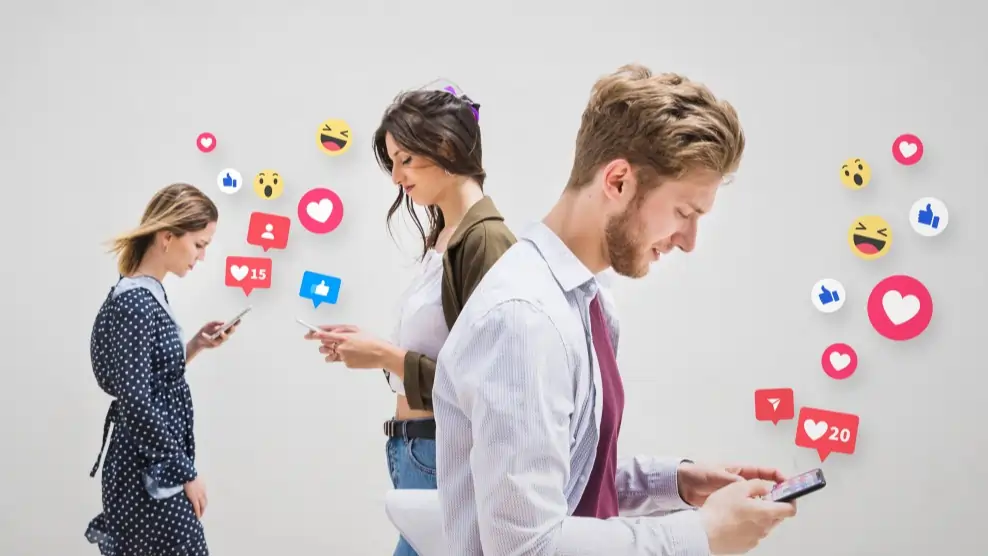Impact of Social Media on Teen Self-Esteem: Introduction
Social media has become an inseparable part of teenage life in today’s digital world. Platforms like Instagram, TikTok, Facebook, and Snapchat shape how young people connect, express themselves, and view the world around them. However, the impact of social media on teen self-esteem has emerged as a critical concern for parents, educators, and mental health professionals.
Research consistently shows that teenagers who spend more than three hours daily on social media face twice the risk of developing negative mental health outcomes, including anxiety, depression, and low self-esteem. The adolescent brain, still developing and seeking validation, becomes particularly vulnerable to the comparison culture and unrealistic standards promoted on these platforms.
Understanding how social media affects teen self-esteem is crucial because adolescence represents a pivotal time for identity formation and emotional development. During these formative years, young people are naturally seeking acceptance and trying to figure out who they are. When this process occurs largely through digital screens and filtered images, it can significantly distort their self-perception and confidence levels.
This comprehensive guide explores the complex relationship between social media use and teenage self-esteem, examining both the harmful effects and potential benefits while providing practical strategies for healthier digital habits.
How Social Media Creates Comparison Culture Among Teens
The impact of social media on teenage self-esteem begins with the fundamental human tendency to compare ourselves to others. However, social platforms amplify this natural behavior in unprecedented ways. Unlike face-to-face interactions, social media presents carefully curated versions of people’s lives, creating what experts call a “highlight reel” effect.
Teenagers spend the majority of their social media time viewing other people’s content rather than creating their own. This passive consumption leads to constant upward comparisons, where teens measure themselves against seemingly perfect images and experiences shared by peers, celebrities, and influencers. According to social comparison theory, these upward comparisons typically result in decreased self-esteem and increased feelings of inadequacy.
The algorithmic nature of social media makes this problem worse. Platforms are designed to show users content that keeps them engaged, often prioritizing posts with high interaction rates. This means teens are more likely to see the most popular, polished, and enviable content, creating a distorted perception that everyone else is living a better, more exciting life.
Research shows that about 90% of Gen Z individuals report feeling dissatisfied with their lives after comparing themselves to others on social media platforms. This comparison culture is particularly damaging because teenagers often forget that what they see online represents only the best moments of someone’s life, not their complete reality.
The pressure to maintain their own perfect online image adds another layer of stress. Teens feel compelled to present idealized versions of themselves, leading to anxiety about posting the “right” content and receiving enough likes and comments. This creates a cycle where they simultaneously feel inadequate compared to others while struggling to maintain unrealistic standards for their own online presence.
The Devastating Effects on Body Image and Self-Worth
One of the most significant aspects of the impact of social media on teen self-esteem involves body image distortion and unrealistic beauty standards. Social media platforms heavily emphasize physical appearance, with filters, editing tools, and carefully posed photos creating impossible standards of beauty.
Studies indicate that exposure to idealized images on social media directly correlates with body dissatisfaction, particularly among teenage girls. Research from Facebook’s own internal studies found that Instagram makes body image issues worse for one in three teenage girls. The constant exposure to filtered, edited, and professionally shot images creates unrealistic expectations about how people should look.
The availability of beauty filters and editing apps allows users to drastically alter their appearance, smoothing skin, changing facial features, and creating flawless looks that don’t exist in reality. When teenagers regularly see these enhanced images, they begin to perceive them as normal, leading to dissatisfaction with their natural appearance.
This digital beauty standard problem extends beyond just physical appearance. Social media culture often links self-worth to external validation through likes, comments, and follower counts. Teenagers begin measuring their value based on the engagement their posts receive, creating an unhealthy dependence on others’ approval for their self-esteem.
The impact becomes particularly severe when teens don’t receive the expected social media validation. Studies show that teenagers who feel bothered by receiving fewer likes than anticipated on their posts demonstrate significantly lower self-esteem scores. The immediate feedback nature of social media means that self-worth can fluctuate dramatically based on online interactions throughout the day.
Body image issues triggered by social media can lead to more serious problems, including eating disorders, anxiety, depression, and self-harm behaviors. The pressure to achieve unrealistic physical standards promoted online has contributed to increasing rates of body dysmorphia and disordered eating patterns among teenagers.
Mental Health Consequences and Warning Signs
The impact of social media on teen self-esteem extends far beyond temporary mood changes, often developing into serious mental health conditions. Research consistently demonstrates strong correlations between excessive social media use and increased rates of depression, anxiety, and other psychological disorders among teenagers.
Cyberbullying represents one of the most direct ways social media damages teen self-esteem. The anonymity and distance provided by online platforms can lead to cruel behavior that wouldn’t occur in face-to-face interactions. Teenagers who experience cyberbullying often internalize negative comments and develop lasting self-doubt and confidence issues.
Sleep disruption caused by late-night social media scrolling further compounds mental health problems. The blue light from screens interferes with natural sleep patterns, while the mental stimulation from constant content consumption makes it difficult for teens to wind down. Poor sleep quality directly impacts mood, cognitive function, and emotional regulation, creating a cycle where social media use worsens overall mental health.
Parents and caregivers should watch for several warning signs that indicate social media is negatively affecting a teenager’s self-esteem. These include withdrawal from family activities and real-world friendships, dramatic mood swings related to online interactions, obsession with appearance and posting the “perfect” photo, anxiety when unable to check social media, declining academic performance, and expressions of feeling worthless or inadequate.
The fear of missing out (FOMO) has become a significant source of anxiety for many teenagers. Seeing peers’ social activities, achievements, and experiences online can create persistent feelings that their own lives are boring or inadequate. This leads to compulsive social media checking and increased anxiety about their social status and life experiences.
Studies indicate that discussing or viewing self-harm content on social media can normalize these behaviors and increase the risk of teens engaging in similar activities. The algorithmic nature of social platforms means that teens who search for mental health content may be fed increasingly extreme material, potentially worsening their psychological state.
Positive Aspects and Potential Benefits
While much attention focuses on the negative impact of social media on teenagers, these platforms can also provide significant benefits when used thoughtfully and in moderation. Understanding these positive aspects helps create a balanced perspective on teen social media use.
Social media can provide crucial connection and support for teenagers who feel isolated or marginalized in their offline environments. LGBTQ+ youth, teens with mental health challenges, and those from minority communities often find acceptance and understanding through online communities that may not exist in their immediate physical environment.
These platforms enable teenagers to express their creativity and develop their identity through sharing art, music, writing, and other forms of self-expression. When teens engage in advocacy, social justice causes, or creative projects online, it can significantly boost their self-confidence and sense of purpose.
Research shows that when teenagers express their opinions and engage in meaningful discussions on social media, they experience increased well-being and self-awareness. This process supports healthy identity development and contributes to building a strong sense of self.
Social media can also provide access to valuable mental health resources, educational content, and support networks. Many organizations now use these platforms to share positive messages, coping strategies, and information about mental health services that might not otherwise reach teenagers.
The key difference lies in how teenagers engage with social media content. Active participation through creating, sharing meaningful content, and engaging in positive discussions tends to boost self-esteem, while passive consumption and comparison-focused browsing typically decreases it.
When used to maintain real-world friendships and strengthen existing relationships, social media can enhance rather than replace face-to-face connections. The ability to stay in touch with friends, share experiences, and provide mutual support through these platforms can be genuinely beneficial for teen social development.
Practical Strategies for Healthier Social Media Use
Parents and teenagers can work together to minimize the negative impact of social media on teen self-esteem while maintaining the positive benefits of digital connection. Implementing practical strategies creates a foundation for healthier relationships with technology.
Setting Clear Boundaries and Time Limits: Establish specific times and locations for social media use. Experts recommend limiting social media to 1-2 hours daily maximum and creating tech-free zones in bedrooms and during family meals. Many devices now include built-in screen time monitoring tools that can help track and limit usage.
Curating Positive Content: Encourage teenagers to actively curate their social media feeds by unfollowing accounts that promote unrealistic standards or negative feelings. Instead, they should follow accounts that inspire creativity, share educational content, promote body positivity, or align with their genuine interests and values.
Promoting Real-World Activities: Balance online time with offline activities that build genuine self-esteem through skill development and real-world achievement. Sports, hobbies, volunteering, and face-to-face social activities provide opportunities for teens to feel accomplished and valued based on their abilities rather than their online image.
Teaching Media Literacy: Help teenagers understand how social media works, including how algorithms determine what content they see and how images are typically edited or filtered. This knowledge helps them maintain perspective about the reality of what they’re viewing online.
Encouraging Open Communication: Create an environment where teenagers feel comfortable discussing their online experiences, both positive and negative. Regular conversations about social media help parents identify problems early and provide support when needed.
Modeling Healthy Behavior: Parents should demonstrate balanced technology use and avoid being constantly distracted by their own devices during family time. Children learn more from observing behavior than from lectures about screen time limits.
Creating Alternative Sources of Validation: Help teenagers develop self-worth based on their character, efforts, and real-world relationships rather than online metrics. Celebrate achievements, personal growth, and positive contributions to family and community.
Frequently Asked Questions
Q: How much time should teenagers spend on social media daily?
A: Mental health experts recommend limiting social media use to 1-2 hours per day maximum. Research shows that teenagers who use social media for more than 3 hours daily face significantly higher risks of developing mental health problems, including anxiety and depression.
Q: What are the early warning signs that social media is affecting my teen’s self-esteem?
A: Watch for withdrawal from family and friends, mood swings related to online activity, obsession with appearance and posting photos, anxiety when unable to check social media, declining grades, frequent negative self-comparisons, and expressions of feeling inadequate or worthless.
Q: Should parents monitor their teenager’s social media accounts?
A: Parents should take a balanced approach that includes some monitoring, especially for younger teens, while building trust through open communication. This might involve knowing which platforms teens use, having conversations about their online experiences, and using parental controls when appropriate.
Q: Can social media have any positive effects on teen self-esteem?
A: Yes, when used thoughtfully, social media can boost self-esteem by providing creative outlets, connecting teens with supportive communities, enabling self-expression, and offering access to mental health resources. The key is active rather than passive engagement with content.
Q: What should I do if I think social media is causing my teen to have mental health problems?
A: If you notice persistent changes in mood, behavior, or academic performance that seem linked to social media use, consider consulting with a mental health professional. In the meantime, have open conversations with your teen and consider implementing screen time limits and content restrictions.
Q: Are certain social media platforms worse for teen self-esteem than others?
A: Research suggests that image-focused platforms like Instagram and Snapchat may be more harmful to self-esteem than text-based platforms. However, the way teenagers use any platform matters more than the specific app itself.
Conclusion
The impact of social media on teen self-esteem represents one of the most significant challenges facing young people today. While these platforms offer valuable opportunities for connection, creativity, and self-expression, they also create unprecedented pressures around appearance, social status, and constant comparison with others.
The research is clear: excessive social media use correlates with increased rates of depression, anxiety, and low self-esteem among teenagers. The combination of algorithmic content curation, unrealistic beauty standards, cyberbullying potential, and the addictive nature of social media creates a perfect storm for self-esteem problems during the critical adolescent years.
However, the solution isn’t to eliminate social media entirely from teenagers’ lives. Instead, parents, educators, and teens themselves must work together to develop healthier relationships with these powerful tools. This involves setting clear boundaries around usage time and content, promoting media literacy, encouraging real-world activities that build genuine confidence, and maintaining open communication about online experiences.
The key lies in helping teenagers understand that their worth isn’t determined by likes, followers, or how they compare to carefully curated online images. By fostering self-esteem based on character, effort, and real-world relationships, we can help young people navigate social media in ways that enhance rather than diminish their sense of self-worth.
As social media continues to evolve, so too must our approaches to helping teenagers use these platforms safely and positively. By staying informed about the impact of social media on mental health and implementing evidence-based strategies, we can help ensure that technology serves to support rather than undermine the healthy development of the next generation.
Read More:
- Eating Disorders: Psychological Roots and Recovery
- Effective Bipolar Disorder Management Strategies
- How to Handle Insults: Stay Strong and Confident
- PTSD (Post Traumatic Stress Disorder): Healing & Hope
- Narcissistic Behavior: Signs and Solutions
- Gut Microbiome’s Role in Mental Health
- Cultural Influences on Perception and Behavior




